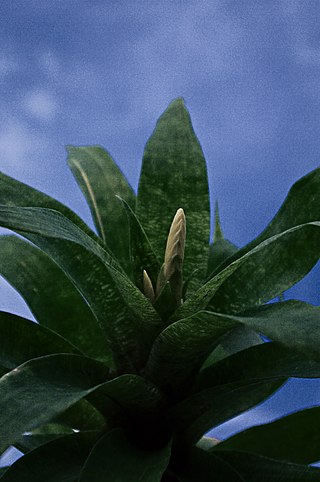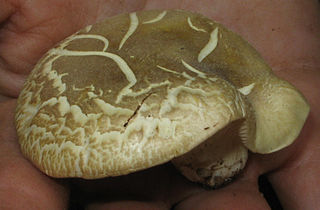Related Research Articles

Naegleria is a free living amoebae protist genus consisting of 47 described species often found in warm aquatic environments as well as soil habitats worldwide. It has three life cycle forms: the amoeboid stage, the cyst stage, and the flagellated stage, and has been routinely studied for its ease in change from amoeboid to flagellated stages. The Naegleria genera became famous when Naegleria fowleri, a human pathogenic strain and the causative agent of primary amoebic meningoencephalitis (PAM), was discovered in 1965. Most species in the genus, however, are nonpathogenic, meaning they do not cause disease.
Paramachaerium is a genus of flowering plants in the family Fabaceae native to Amazonia. It was recently assigned to the informal monophyletic Pterocarpus clade within the Dalbergieae.

Rilaena is a genus of the harvestman family Phalangiidae.

Naegleria gruberi is a species of Naegleria. It is famous for its ability to change from an amoeba, which lacks a cytoplasmic microtubule cytoskeleton, to a flagellate, which has an elaborate microtubule cytoskeleton, including flagella. This "transformation" includes de novo synthesis of basal bodies.

Vriesea ospinaevar.gruberi is a variety of flowering plant in the family Bromeliaceae.

Vriesea ospinae is a plant species in the genus Vriesea. It is endemic to Colombia. Two varieties are recognized:
- Vriesea ospinae var. gruberiH.Luther
- Vriesea ospinae var. ospinae

Cantharocybe is a genus of mushroom-forming fungi in the family Hygrophoraceae. The genus was described by American mycologists Howard E. Bigelow and Alexander H. Smith in 1973. Cantharocybe contains three species: the type C. gruberi, and C. brunneovelutina from Belize, reported as new to science in 2011, and C. virosa, transferred from "Megacollybia", and found in Bangladesh and India.

Dikerogammarus is a genus of amphipod crustaceans, containing the following species:
Amblyseius gruberi is a species of mite in the family Phytoseiidae.
Turbonilla gruberi is a species of sea snail, a marine gastropod mollusk in the family Pyramidellidae, the pyrams and their allies.

Hemilophini is a tribe of longhorn beetles of the subfamily Lamiinae.
Woytkowskia is a genus of longhorn beetles of the subfamily Lamiinae, containing the following species:
Stiphropus is a genus of crab spiders in the family Thomisidae, containing twenty one species from Africa and Asia.
Cantharocybe brunneovelutina is a species of the family Hygrophoraceae.
Woytkowskia travassosi is a species of beetle in the family Cerambycidae. It was described by Lane in 1971. It is known from Brazil.
Bhutaniella is a genus of Asian huntsman spiders that was first described by Peter Jäger in 2000.

Elonus is a genus of ant-like leaf beetles in the family Aderidae. There are about seven described species in Elonus in North America.
Elonus nebulosus is a species of ant-like leaf beetle in the family Aderidae. It is found in North America.
Elonus excavatus is a species of ant-like leaf beetle in the family Aderidae. It is found in North America.
Elonus hesperus is a species of ant-like leaf beetle in the family Aderidae. It is found in North America.
References
- ↑ BioLib.cz - Woytkowskia gruberi. Retrieved on 8 September 2014.